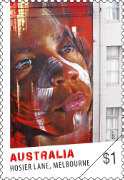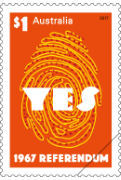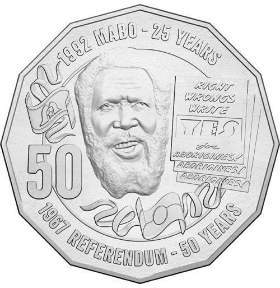History
Timeline results for
Found 1175 results for your search. Showing page 46 of 59.
2016
-
The SA Minister for Aboriginal Affairs and Reconciliation, Kyam Maher, announces that the government commits $4.4 million over 5 years towards the establishment of up to 40 treaties across South Australia. This commitment to individualised treaties for Aboriginal communities is different to Victoria's plans for a statewide treaty. The investment also funds the appointment of an independent commissioner for treaty.
Treaty is an important step towards addressing the wrongs of the past. The fact that so many Aboriginal people to this day face such significant disadvantage remains the greatest stain on our society.
— Kyam Maher, South Australian Minister for Aboriginal Affairs and Reconciliation [1] -
The Tasmanian government passes into law an amended preamble to the Tasmanian Constitution Act to formally recognise Aboriginal people “as Tasmania’s First People and the traditional and original owners of Tasmanian lands and waters”. Tasmania was the last state that had to amend its constitution in that way.
2017
-
NITV launches Australia’s first ever Aboriginal animated children’s series, Little J & Big Cuz.
-
Ken Wyatt is appointed Minister for Aged Care and Indigenous Health, making him the first Aboriginal federal minister. It makes Mr Wyatt not only the first Aboriginal Australian elected to the House of Representatives and first to the frontbench, but also the first to lead a major portfolio.
-
The Federal Court rules that Indigenous Land Use Agreements (ILUA) can only be registered if they are signed by all registered Native Title Claimants who are “named applicants”, replacing a previous court decision that allowed registration without all named applicants having signed the ILUA (called the McGlade decision).
-
The Co-Chairs of the National Congress of Australia’s First Peoples and prominent Aboriginal leaders from across Australia formally present the Redfern Statement to parliamentary leaders in Canberra.
-
Figure skater Harley Windsor, a Weilwyn, Gamilaraay and Ngarrable man from Western Sydney, becomes the first First Nations person and first figure skater to represent Australia to win gold at the 2017 World Junior Championships in Taipei, Taiwan. He is paired with Russian skater Katya Alexandrovskaya.
-
Hip-hop duo A.B Original (Yorta Yorta man Briggs and Ngarrindjeri man Trials) win the Australian Music Prize (the biggest prize for an album in Australia) with Reclaim Australia.
-
UN Special Rapporteur on the rights of indigenous peoples, Victoria Tauli-Corpuz, presents her preliminary report on the human rights situation of Aboriginal people.
-
June Oscar AO, a Bunuba woman from Fitzroy Crossing, WA, starts her 5-year term and becomes the first female Aboriginal and Torres Strait Islander Social Justice Commissioner of the Australian Human Rights Commission.
-
More than 250 Aboriginal leaders from across the country gather at Uluru at the Referendum Council’s National Convention to identify amendments required for constitutional recognition of Aboriginal people. But the government rejects a proposal for a constitutionally enshrined voice to Parliament.
-
16 Aboriginal nations from across the northern Murray-Darling Basin sign a treaty between themselves, known as the Union of Sovereign First Nations of the Northern Murray-Darling Basin, to have a united voice on Aboriginal issues and more bargaining power and economic opportunities.
-
Tracey Moffatt (Bedevil) represents Australia at the 57th Venice Biennale (13 May – 26 November), making her the first Aboriginal artist to present a solo exhibition at the event.
-

Artist Adnate is well known for his giant art works which often feature Aboriginal subjects. One stamp in Australia Post's Street Art issue shows artist Adnate’s large-scale work in Hosier Lane, Melbourne. The City of Melbourne commissioned this 23 metre mural of an Aboriginal boy in 2014. As in this portrait, Adnate’s subjects are often members of Aboriginal communities, and the artist has done a significant amount of fundraising work in this area.
-
Aboriginal leaders from across Australia gather at Uluru from 23–26 May to identify amendments required for constitutional recognition of Aboriginal people, culminating in the Uluru Statement from the Heart. This is probably the first time that Aboriginal people presented a united position and a single key recommendation.
-

The stamp overlays two fingerprints and the iconic 'Yes' that marked the campaign. An Australia Post stamp commemorates the 50th anniversary of the 1967 referendum. On 27 May 1967, Australians voted to change the constitution to empower the federal government to make legislation for Aboriginal people, in the same way it could for all other Australians, and to include Aboriginal people in the census.
The stamp combines contemporary dot art elements and curved lines to form a symbol of two fingerprints merging to form one. The word "Yes" in the iconic referendum-campaign font symbolises strength in unity and what has been thus far achieved.
-
Teenager and Gumbaynggirr woman Aretha Brown is chosen by 60 peers as the first female Aboriginal Youth Prime Minister of Australia at the National Youth Parliament in Canberra. In this role she meets Prime Minister Malcolm Turnbull, Opposition leader Bill Shorten and the Governor General Sir Peter Cosgrove.
-

The front side of the 50-cent coin shows Eddie Mabo's face, the Torres Strait Islander and Aboriginal flags and a 1967 referendum campaign poster. The Royal Australian Mint issues a special 50-cent coin, "Pride & Passion", to mark the 25th anniversary of the High Court Mabo decision and the 50th anniversary of the 1967 referendum. Artist and grand-daughter of Eddie Mabo, Boneta-Marie Mabo, helped with the design of the coin. Only 1.4 million coins are minted.
-
Since 1997 Australia Post celebrates living Australians who have positively shaped Australian society with its Australian Legends Award. In 2017 it honours three Aboriginal leaders: Tom Calma, Lowitja O’Donoghue and Galarrwuy Yunupingu for their tireless and lifelong efforts to improve social and economic outcomes for Aboriginal peoples. Together, their work has spanned the areas of land rights, economics, self-determination, health, welfare, education and reconciliation.
Since its inception, Australia Post announced the Australian Legends Award on Australia Day. Out of respect for those who associate 26 January with invasion and the colonisation of Aboriginal people, it scheduled this year's announcement to May, coinciding with the 50th anniversary of the 1967 referendum. [2]

Portraits of Aboriginal Elders Tom Calma, Lowitja O’Donoghue and Galarrwuy Yunupingu. -
The directors of the Laynhapuy Homelands Aboriginal Corporation (Laynha) based in Yirrkala (North East Arnhem Land, NT) representing many Yolngu clans complain they have received "less services, less funding and less true engagement and consultation" since the intervention and that politicians are not listening to them. They demand self-determination from the government.



